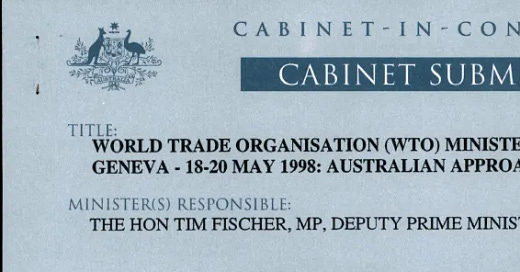WTO: Australia's Approach to the WTO's Second Ministerial Conference
The WTO’s 13th Ministerial Conference will be held in just a few weeks time. While there is plenty of commentary on what to expect there, for this Trade Notes post I thought I’d instead look back. Thanks to the National Archives of Australia, we have access to an Cabinet Minute that was prepared ahead of the WTO’s Second Ministerial Conference back in 1998 - Submission JH98/0167: World Trade Organisation (WTO) Ministerial Conference: Geneva - 18-20 May 1998: Australian Approach.1
The submission was made to get Cabinet approval for Australia’s approach to a potential new multilateral trade round. The Cabinet agreed that at the Ministerial Conference, Australia would support preparatory work being done to allow for the launch of the new round at the following Ministerial Conference (although we know how things went in 1999). I’ve extracted some parts I’ve found interesting below.
First, with agriculture the key concern for Australia, it was the Europeans that were the major risk (along with Japan and Korea). The big stick that Australia had if there agriculture couldn’t be resolved? A walk-out:
in the unlikely event of a major breakdown over agricultural issues between the European Union (EU) (or Japan or Korea) and Australia…the Deputy Prime Minister and the Minister for Trade be allowed discretion to invoke the threat of a withdrawal from the Ministerial Conference or, in a worst case, to actually withdraw.
Second, while today it is plurilaterals on specific issues that are the likely way forward for new rule-making at the WTO, in 1998 Australia was an early advocate for (and emphasising the benefits of) a comprehensive negotiation:
6. Australia has been an early proponent for a new multilateral round arguing that only a comprehensive approach will provide the critical mass needed to achieve the necessary balance of advantages and concessions sufficient to move the liberalisation agenda substantially forward. The EU has taken a key role in promoting the notion of a new round… this may seem surprising because of Europe’s protectionist agricultural policies but the EU accepts that further agricultural negotiations are already on the table and it may sense there is scope for securing offsetting concessions for further reform of the Common Agricultural Policy.
Third, the submission emphasised the need for US leadership at the WTO, something that has been an increasing concern of late:
10. In this developing situation, leadership from the United States will be essential. The history of successive rounds in the GATT underscores the reality that an unambiguous American push is needed before they acquire any momentum. I recommend we encourage the Administration to move to this level of ambition.
Fourth, Australia saw a “key role” for itself in building support for the new round, just as now it is an extremely active player across a range of issues in Geneva:
16. …there is also a key role for Australia in building like-minded support for a new round… Australia has also been active in putting a coalition of key countries together…that actively supports the launch of a new round.
Fifth, the submission was pragmatic in relation what was likely to be achievable at the Ministerial Conference, saying “it would be unrealistic to expect the outcome…to be a clear-cut decision to begin work on preparation for a new round” and:
12. The Geneva Ministerial is an important way-point to a new round. It will not, however, be in a position to launch a new round but we would want any outcome to allow the next Ministerial in 1999 the ability to launch comprehensive negotiations, starting in the year 2000. To enable a round to begin in 2000, it will be necessary for this year’s Ministerial to take a decision which is sufficiently clear to point the WTO in the right direction leading up to next year.
And finally, it recognised that the expanding international trade agenda and its increasing reach ‘behind the border’ was leading to higher levels of public interest and concern:2
20. The Uruguay Round was the first round which brought a significant public reaction. With the injection into it of greater parts of the domestic agenda, it whetted the interest of NGOs in the multilateral trade agenda. … I would anticipate a higher level of public interest (and some criticism) around the time when the WTO will need to take the decision on launching a new Round (probably some time next year).
This has of course only continued - with the most recent evidence of this being the campaigns regarding digital trade rules and data rules.
While MC13 is a very a different beast compared to MC2, I think this Cabinet submission still provides an interesting insight into trade negotiations, the issues and strategies driving trade policy, and how some aspects of these have changed while others have very much stayed the same.
For more interesting history from 1998 see my X/Twitter posts on what I found in the US Archives from the Clinton Administration’s files on the moratorium on custom duties on electronic transmissions.
It’s also interesting to note that it was in 1997-1998 that protests against the Multilateral Agreement on Investment caused that negotiation to ultimately fail, including protests in Australia. Although this Cabinet Submission is not alarmist about a similar reaction to a new round of WTO negotiations - and in the end Australian protests against the 1999 meetings were more muted (see here for an interesting discussion of this).




